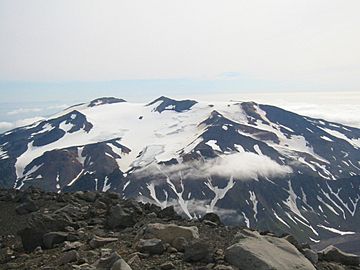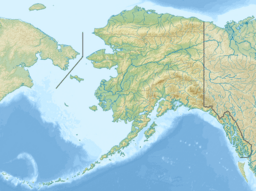Mount Takawangha facts for kids
Quick facts for kids Takawangha |
|
|---|---|

Takawangha as seen from East Tanaga
|
|
| Highest point | |
| Elevation | 4,754 ft (1,449 m) |
| Geography | |
| Geology | |
| Mountain type | Stratovolcano |
| Volcanic arc | Aleutian Archipelago |
| Last eruption | 1550? |
Mount Takawangha is a large, cone-shaped volcano called a stratovolcano. It is found on Tanaga Island in Alaska, United States. This volcano stands close to another volcano named Mount Tanaga, which shares the island's name.
Mount Takawangha is 4,754 feet (1,449 meters) tall. This makes it the second-highest peak on Tanaga Island. East of Takawangha, you can also find older volcanoes that have been worn down over time.
What is Mount Takawangha?
Mount Takawangha is a type of volcano known as a stratovolcano. These volcanoes are usually tall and cone-shaped. They are built up over many eruptions of lava, ash, and rocks. Scientists believe Takawangha might have last erupted around the year 1550.
Inside the Volcano
The top of Mount Takawangha is mostly covered in ice. However, there are four younger craters near the summit. These craters have erupted in the last few thousand years. Inside its main crater and on its sides, you can find small, cone-shaped hills made of volcanic rock pieces. These are called tephra cones.
Sometimes, it's hard for scientists to tell which volcano erupted. There's a chance that some eruptions thought to be from Mount Tanaga actually came from Mount Takawangha. Scientists continue to study these volcanoes to learn more about their past activity.
 | Precious Adams |
 | Lauren Anderson |
 | Janet Collins |


